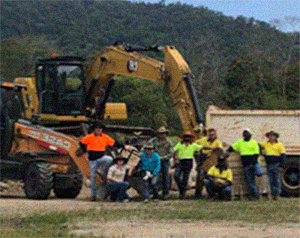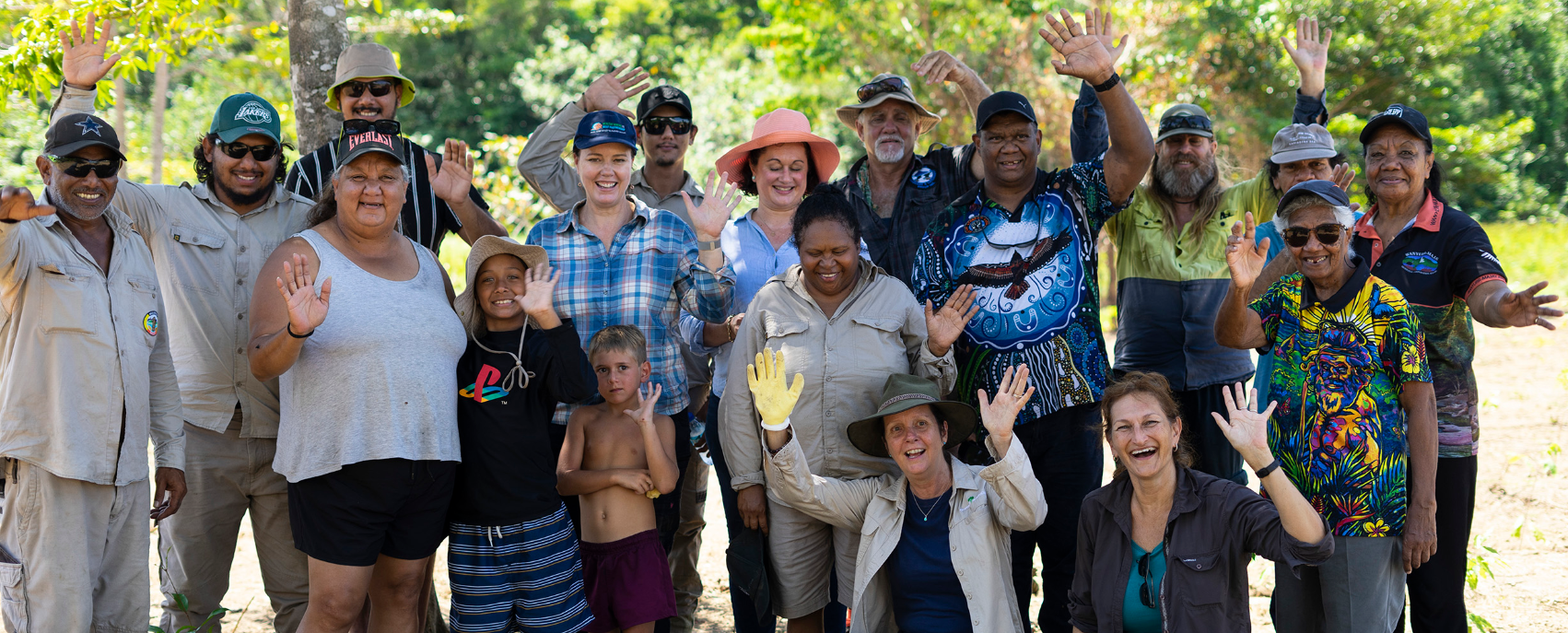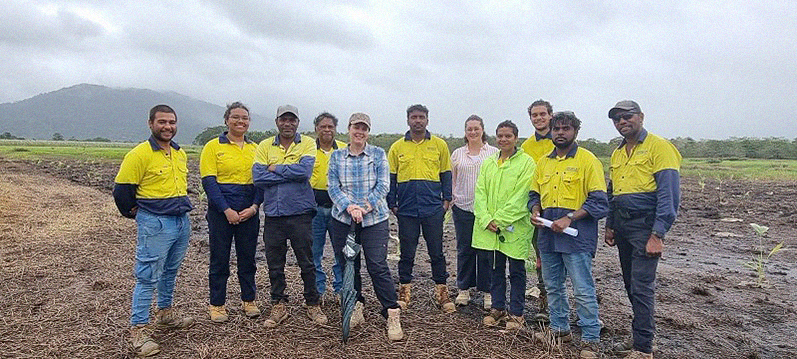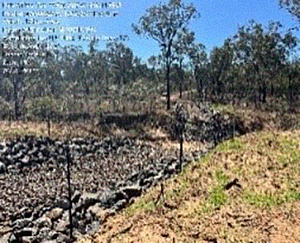Reef Assist program
The $34 million Reef Assist program (the program) delivers environmental projects and creates regional jobs for Queenslanders in the Great Barrier Reef catchment.
Originally established in 2020 to create alternative employment opportunities in tourism-dependent regions impacted by the COVID-19 pandemic, the program has had two phases and also includes the Reef Assist Traditional Owner Grants Program.
About the Reef Assist program
The Queensland Government's Reef Assist program commenced in 2020.
In the last couple of years, it's had a really strong focus on environmental projects.
Plus, creating regional jobs, a lot of the people who've been employed came from no employment before and Reef Assist has given them training.
And so our hope is that people will go on to other employment and take their skills and,
build their career going forward.
Reef Assist has to have a strong environmental outcome. We want improved water quality.
We'd like to see the reef assist program to carry on.
The part that it delivers most of all is the training and employment opportunities.
And that skills base, particularly building that skills base, for people who are going to manage Country in later years.
And I think that's the most important thing is it’s given the opportunity for us to train people
in relevant projects and relevant skill sets that fit those projects.
I'm a part of the Wanjuru-Yidinji nation here too, as well. I did some leadership training, did my ACDC, tractor work, but yeah.
Following my father's footsteps, he was in the national parks. So that's good to follow in their footsteps and, do it with the mob as well.
Restoring country and, trying to get it back to what it once was.
It's been a fantastic program from the point of view of environmental, social, economic and cultural outcomes.So this has been a real game changer for them.
Reef Assist really did help to build regional skills for that environmental remediation space.
And essentially what we've been able to do through the funding provided from Reef Assist is build really skilled contractors locally.
So that acts to improve water quality over time and also improve the resilience of the Great Barrier Reef.
So Reef Assist has been part of a large scale, broader project between our partners to build large scale wildlife habitat corridors.
We have people that have been employed through the program for about 4 to 5 years now.
So this was an alternative route for Landcare management.
Our program with Reef Assist was called Business Activation with First Nation engagement.
What we set out to achieve was to work with industry in Townsville to build something that was long term and sustainable.
So some of the outcomes were continuous employment of over 25 crew, various around 20 sites across the catchment, all working towards improving water quality in the Great Barrier Reef.
So we got involved with Reef Catchments through Pioneer Landcare.
We very quickly noticed that there was quite a number of animals that were accessing the creek and using the creek as a water source.
So we realised that it was really important for us to revegetate. And, protect the creek from the erosion and all the weeds that had kind of overgrown into the creek.
The Reef Assist 2.0 program, enabled enabled six Madjaybana Rangers, to upskill, extensive training.
Our highlight was partnering with Mulgrave Landcare and involving the wider Babinda and Gordonvale communities.
Pursuing the Reef Assist program, so it helps our Indigenous Rangers.
A big part of why we want to look after water is because we have so much here
to look after and to be working on Country, back on Country, is something I hold very highly.
This is one of the few programs that has a really strong employment focus.
And, we need train people for the future. We need workers and people who understand how to do on-ground work.
It's creating a great legacy of people who are employed, who are passionate, who are skilled about the environment to make improvements to the Great Barrier Reef catchment.
On this page
Reef Assist 1.0
Reef Assist 1.0 commenced in October 2020 with a total investment of $13.5 million delivered over a two-year period in the Wet Tropics, Burdekin and Mackay Whitsunday regions.
Eleven projects were delivered in partnership with local governments, natural resource management organisations and public and private organisations generating more than 230 full-time, part-time and casual jobs.
Read more about the projects delivered during 2020–2022 under Reef Assist 1.0.
Reef Assist 2.0
In 2022, the Queensland Government invested $20 million into the program for Reef Assist 2.0 and contracted eleven projects across multiple remote, regional, peri-urban and urban locations, generating an additional 200+ regional jobs.
Many of the projects provide valuable opportunities for First Nations participants to undertake practical work on Country, with approximately half of the jobs created being filled by First Nations people, and over a quarter of the jobs being undertaken by youth, many in their first paid employment.
In addition to creating jobs and providing diverse training programs which upskill participants, there is a wide range of landscape repair work underway which will lead to improvement in the quality of water entering the Reef.
On-ground activities include:
- gully and streambank restoration
- riparian revegetation
- natural wetland restoration and constructed wetland development
- cane drainage management systems
- urban development erosion management
- pastoral land management.
As of July 2025, five projects have been completed so far.
Wet Tropics region
Jaragun Ecoservices: Restoration of Wetland Function in the Russell River Catchment
- revegetation of both natural and constructed wetlands for reductions in dissolved inorganic nitrogen pollutant loads to the Great Barrier Reef
- provision of professional development opportunities including formal training in maritime operations, horticulture, first aid and fire management to leadership training.
Johnstone Region Landcare Group: Cassowary Coast Propagation and Riparian Repair Project
- revegetation of riparian sites along the Johnstone River reducing sediment and nutrient loads entering waterways and extending corridors and habitats for wildlife (including endangered species such as the Southern Cassowary)
- collection of seeds and propagation of over 100,000 native trees for current and future projects.
Wet Tropics Management Authority: Atherton Tablelands Riparian Revegetation Project (phase 1)
- continued work with NQ Land Management Services from the Reef Assist 1.0 Boots on the Ground project, focusing on new sites
- revegetation of degraded Atherton Tablelands landscapes, including planting and maintaining 65,000 seedlings, plus 50,000 seeds collected and propagated.
Wet Tropics Management Authority: Atherton Tablelands Riparian Revegetation Project (phase 2)
- is improving water quality on the Atherton Tablelands through a partnership with the Choorechillum Prescribed Body Corporate, which represents the Ngadjon-jii people and traditional custodians of the land
- focusing on key sites identified by Ngadjon-jii Peoples and the Wet Tropics Management Authority that are contributing to poor water quality.
Burdekin region
Townsville City Council: Townsville Landscape Regeneration through First Nations Knowledge and Delivery
- catchment restoration activities in the Black-Ross basins, including gully, sheet and streambank erosion remediation, and soil and land improvement work
- utilisation of innovative urban development erosion control products and techniques.
Mackay Whitsunday region
Reef Catchments: Mackay Whitsunday Streambank Stewardship Program
- riparian revegetation, bank stabilisation and gully erosion remediation to reduce sediment run-off, undertaken in partnership with three Landcare organisations: Whitsunday Catchment Landcare, Pioneer Catchment Landcare and Sarina Landcare Catchment Management Association, Traditional Owners and First Nations people
- supporting the development of a Healthy Country Plan for Koinjmal Country
- enhance the wetland function and improve ecosystem services of the Sandringham wetland.
Burnett Mary region
Burnett Mary Regional Group for Natural Resource Management (BMRG): Burnett River Rubyanna Riparian Restoration Project
- wetland and riparian restoration to restore 18.7 hectares of riparian vegetation at the Burnett River Rubyanna site
- environmental training and employment for Indigenous Land and Sea Rangers.
Completed projects
Cape York NRM: Cape York Gully Remediation and Creation of Indigenous Employment Pathways

This project delivered environmental, social and employment outcomes providing formal and practical training, increasing skills, confidence and employment prospects while reducing sediment entering the Reef through Cape York’s Bloomfield River and Normanby River catchment.
- 17 First Nations people trained in heavy machinery use and road and track construction on traditional Country in remote parts of Cape York
- 10 large-scale erosion control structures installed over 14.4 hectares
- 13 tonnes of sediment expected to be prevented from reaching the Reef annually.
“Our participants gained invaluable hands-on experience and life skills. We’ve seen fantastic outcomes, with several now employed in local earthmoving businesses or upskilled in their current roles. This project has been transformative for individuals and communities alike.”
Greening Australia: Wet Tropics Wetland and Cane Drainage Water Quality Treatment Systems
Undertaken in partnership with Madjandji Aboriginal Corporation and Mulgrave Landcare, this project targeted the repair and revegetation of wetlands and riparian cane drainage systems in the Mulgrave catchment to deliver improved Great Barrier Reef water quality. The project delivered significant employment, training and environmental restoration outcomes.

- 14 people employed
- 6 Madjandji Rangers completed accredited and informal training programs
- 19,500 trees planted
- 20,200 seedlings propagated
- 257 kilograms of seeds processed
- 9 hectares of riparian vegetation restored
- 142 nursery events and 22 planting days.
"For Madjandji people, being part of the Reef Assist Program was more than just an opportunity—it was a journey that transformed not only me, but our Elders and rangers too. From the beginning, our shared passion for protecting Country, guided by our Elders, brought us together.
The program gave us hands-on experience in reef restoration and land management, which not only deepened our environmental knowledge but also boosted our confidence and teamwork. Working alongside Greening Australia and fellow partners, we learned how to tackle real-world ecological challenges—something we’ll carry with us for life.
Reef Assist didn’t just benefit us professionally—it touched us personally. It reminded us that when people come together to care for the environment, they end up caring for each other too."
Jabalbina Yalanji Aboriginal Corporation: Daintree River Wawu Dimbi Riparian Revegetation

This project created employment for five Eastern Kuku Yalanji people to work on their land along the Daintree River undertaking revegetation work. The work improved sediment filtration, strengthened the riparian buffer and created a rainforest corridor and habitat for marsupials such as the Bennet’s Tree Climbing Kangaroo, Spotted Quoll and Southern Cassowary at the culturally significant Wawu Dimbi ‘Place of Spirits’.
- over 10,000 trees planted
- 1.9 hectares of riparian habitat restored
- youth engaged through Junior Rangers, with the additional community benefit of significantly improving school attendance from 5% to over 80%.
Despite Cyclone Jasper in December 2023 causing the Daintree River to flood and destroy 3,000 planted trees, and an extended dry season, the project team was able to recover the site and meet their target of 10,000 trees planted.
"Reef Assist 2.0 has been an amazing journey, learning so much along the way, from how to manage a team, to planting techniques to seed dormancy breaking to just how strong and resilient our team actually is. We employed 100% Yalanji People for the project and they all still have continued employment with Jabalbina. Now we have amazing partners, contracts to plant trees, contracts to grow trees, our own projects to support and a voice in the revegetation space up here on our Country."
NQ Dry Tropics: Healing Country 2.0: Burdekin Water Quality Outcomes through Indigenous Partnerships

This project built on the success of a Reef Assist 1.0 project, reducing sediment loss into waterways by installing erosion control structures and targeted weed management and revegetation. It also supported the Birriah people to complete a Caring for Country plan, formalising their goals for their Country.
- 433 small-scale erosion control structures built across almost 200 hectares
- 27 people (5.8 full-time positions) employed with 13 First Nations people employed on Country
- 28 formal and informal training opportunities (including cultural awareness and heritage training) provided.
"I never thought I’d work in something so significant, and it definitely puts a bigger picture in mind of how things work, from inland to ocean and coast."
Greening Australia: Woorabinda Healing Country and Gully Remediation Program

This project partnered with the Woorabinda Aboriginal Shire Council to provide training and employment opportunities in the Woorabinda Aboriginal community. Work included installing erosion control structures, revegetating streambanks and undertaking cultural heritage work. Over $1 million spent with local and First Nations businesses through on-ground works.
- 700 hours of informal and on-the-job training on Country provided to nine community members
- 31.5 tonnes of sediment expected to be prevented from reaching the Reef annually.
"Working with such a diverse range of people on these projects allows you to understand just how interconnected Reef restoration efforts are and need to be. We engage with engineers, traditional owners and elders, scientists, ecologist, planners, policy makers, government approvals officials, machine operators and Shire Councils."